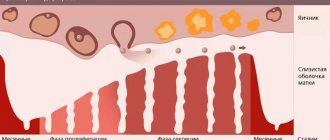The process of the onset of menopause is individual for each woman and depends on the characteristics of her body; for some it goes unnoticed, while others suffer from hot flashes and mood swings. In any case, it is accompanied by a decline in reproductive function and cessation of menstruation. The transition is gradual and usually occurs over 50 years.
Changing the cycle can go both smoothly and with certain inconveniences. Let's figure out what kind of discharge a woman can expect during menopause and menopause, how menopause affects the functioning of the reproductive system, what signs indicate the presence of pathologies and require medical intervention. We will look at how menstruation occurs during menopause in this article.
Declining reproductive function
During menopause, bleeding decreases, and with the onset of menopause it completely disappears, but this does not mean that the woman’s reproductive function has completely died out. The endometrium in the uterus continues to function, causing the formation of estrogen. This process can take up to two years.
The body tries to make the rebuilding process as smooth as possible, so when menopause occurs, a woman continues to feel attractive.
Along with a decrease in the amount of hormones, the female genital organs also undergo changes: the uterus decreases in size, the vagina becomes narrower and less moisturized.
During this period, the possibility of conception and successful gestation cannot be ruled out. The growth of the endometrium in the uterine mucosa provokes the work of the ovaries, forming full-fledged eggs. This process is irregular, but indicates the possibility of conception. Let us next consider how menstruation occurs during menopause.
Bleeding after menopause
Menstruation after menopause is an alarm signal. Uterine bleeding that appears several years after the last menstruation can be a sign of various diseases. I can bleed from the external genitalia, vagina, cervix and endometrium.
Causes of discharge
Detection of menstruation after 58–65 years of age almost always means endometrial cancer. Before looking for another cause, the gynecologist must exclude the possibility of a malignant tumor.
After menopause, the level of the sex hormone estrogen decreases, the walls of the vagina become thinner, become brittle, crack and bleed. Menstruation appears after sexual intercourse, lifting weights, prolonged physical activity, and other actions that cause contraction of the muscles of the reproductive organ.
Diagnostics
Patients with such abnormalities should immediately seek medical help.
Menstruation after menopause can lead to severe blood loss. A hysteroscopy, ultrasound examination of the pelvic and abdominal organs, and tests to detect cancer cells should be performed. The woman will need to undergo a smear test and deep palpation of the abdomen. Only after determining the cause will the gynecologist prescribe treatment.
Principles of treatment
If the cause of menstruation after menopause is estrogen deficiency, replacement therapy is prescribed.
Advice!
Use ointments based on this hormone after or before sexual intercourse. Candles help a lot.
The constant appearance of menstruation after menopause means the need for a hysterectomy. The procedure is necessary if vaginal discharge is a sign of cancer.
The appearance of menstruation during menopause or after it should be regarded as a pathology and consult a doctor. It is better to make sure that periods during and after menopause are not a symptom of the disease. Don't neglect your health. Bleeding after menopause may be the only symptom of a serious pathology.
Changes in the nature of menstruation
The menstrual cycle consists of several periods:
- The period when eggs mature.
- Ovulation period (eggs are released from the follicle).
- The period of growth of the internal endometrium of the uterus.
- The period of aging and death of eggs (in the absence of fertilization).
- Dying and removal of the endometrium in the form of bleeding (menstruation).
But during menopause, how do your periods go?
During menopause, menstruation can occur either in a normal cycle or in a cycle in which there is no ovulation. This is due to a decrease in the level of estrogen, which is responsible for the maturation of eggs. However, do not forget about protection during menopause. Pregnancy and successful pregnancy are not uncommon for women experiencing menopause.
When menopause occurs, discharge can last from 1-2 days to 7-10 days, depending on the characteristics of your body. The complete cessation of menstruation indicates that the ovaries have completely stopped producing estrogen, the structure and shape of the tissues of the ovaries and uterus has changed.
Long periods
Prolonged bleeding often occurs due to the following disorders in the female body:
- hormonal disbalance;
- endocrine disorders;
- diseases of the genitourinary system;
- neoplasms;
- autoimmune processes;
- pathological tissue proliferation;
- thyroid dysfunction.
An individual genetic predisposition to prolonged menstruation even before menopause plays an important role.
Prolonged menstruation can provoke a significant deterioration in the physical and psycho-emotional state, anemia, even hemorrhagic shock. Self-medication in this case is unacceptable.
If menstruation lasts for a long time, more than 2 weeks, a woman may have serious complications. To prevent them from developing, you should visit a doctor and undergo an examination.
Types of menstruation
For most women, menstruation does not cause much trouble and is a common monthly occurrence that requires special attention only to personal hygiene. With the onset of menopause, everything changes: cycle size, abundance, regularity.
How do menstruation go during menopause? There are several types of menstruation at the onset of menopause:
- Gradual cessation. Menstruation comes regularly, but the duration and abundance of “red days” gradually decreases. It can last up to 2-3 years and does not cause anxiety or discomfort in most women.
- Abrupt cessation. Menstruation stops once and for all. In this case, the woman suffers from hot flashes, nervousness, mental disorders and other signs of menopause.
- Discharges that do not have a specific cycle. It is difficult to predict the first and last day; discharge can be either weak or heavy. The break between menstruation can be up to 3-4 months. In this case, during menstruation, the woman feels a general malaise: dizziness, nausea, pressure surges.
These types accompany menopause; when menopause occurs, natural discharge stops completely.
Menstruation during premenopause
During premenopause, the intensity and duration of the menstrual cycle begins to change.
This is due to hormonal imbalance and irregular ovulation. In most women, the volume of blood discharge and the number of days during which it occurs decreases, but on the contrary, there is an increase in both parameters.
Prolonged periods before menopause are considered to be the norm only when there is an alternation of heavy and scanty discharge. There are two possible options. Firstly, long and heavy periods become scanty, and then strong again. Secondly, menstrual bleeding gradually becomes less heavy and irregular.
During perimenopause, the following changes in the menstrual cycle are possible:
- Delays occur. First for a few days, and then for a month or more. Doctors consider a delay of menstruation for up to 6 months to be within normal limits. If there are no periods for more than six months, then this is a sign of menopause.
- Menstrual cycles become irregular. Menstruation comes for several months in a row, then it doesn’t last for 2-3 months, and then it starts again.
- During menstruation, a woman may experience pain or emotional imbalance. Sometimes menstruation is accompanied by dizziness.
- There may be pieces of mucus in the discharge. After all, during this menopausal period the endometrium begins to change. Only dark brown or scarlet color of blood with elements of mucus is considered pathology.
Pathologies of menopause
Can I have periods during menopause? This question interests many.
The initial phase of menopause is characterized by irregular bleeding, but the appearance of heavy periods after a long absence of discharge may indicate the development of pathologies.
The menopausal period requires special attention. Often, it is at this time that various types of benign and malignant tumors begin to develop in a woman’s body. A decrease in hormone levels affects the thinning of the endometrial layer of the uterine mucosa, which leads to a change in structure and provokes the development of pathologies.
Heavy bleeding after the complete cessation of the menstrual cycle is dangerous to health. They may indicate the presence of diseases of the endocrine system, benign and malignant tumors, diseases of the adrenal glands and pituitary gland.
Hormonal imbalances affect not only the functioning of a woman’s reproductive system. They can cause serious diseases in all body systems, such as osteoporosis, breast and heart diseases.
Poor nutrition and bad habits can also cause bleeding.
The appearance of spotting during the postmenopausal period is in no way related to the processes of the menstrual cycle and requires immediate consultation with a doctor.
Perimenopause and menstruation
Menopause is a period in a woman’s life when her reproductive function gradually fades and the level of the sex hormone estrogen decreases until it is completely absent. These changes directly affect the menstrual cycle, which changes depending on the onset of a certain phase of menopause, of which there are 3. The first of them is premenopause. The next ones are menopause and postmenopause, or postmenopause. All of them are characterized by certain symptoms.
Premenopause includes the time from the first signs of menopause to the end of the last menstrual bleeding. In most cases this is around 45-50 years of age. This period is characterized as follows:
- periods become irregular;
- menstruation often disappears for several months up to six months;
- the volume of discharge becomes smaller;
- Your periods don't last as long as they used to.
Why do periods take longer?
The premenopausal period is dangerous because it is very difficult to separate normal menstruation from pathological ones. The reason is the irregular cycle and the fact that prolonged periods before menopause can be a common occurrence. A woman should be alerted to heavy bleeding after the discharge has become less voluminous or has been absent for several months. It is difficult to unambiguously determine whether certain menstruation is normal, because you need to take into account the individual characteristics of the body.
The cause of prolonged periods before menopause is often uterine bleeding caused by:
- Pathology of the endometrium. It consists of the growth of the endometrium due to a failure in the process of normal formation of the egg. With this pathology there is a risk of cancer.
- Myomas. This is the name for benign tumors that develop as a result of malfunctions of the thyroid gland.
- Poor blood clotting. This pathology also often leads to prolonged menstrual bleeding.
- Polycystic disease. This disease affects the ovaries and is characterized by a prolonged absence of menstruation, and then their release in large volumes.
- Polyps. This is the name for neoplasms that are benign and harmless. Their negative impact consists of protracted periods before menopause and more.
- Discontinuation or improper use of oral contraceptives. This often leads to bleeding.
What menstrual irregularities after 45 years are considered normal?
Long periods before menopause can be considered normal at its very first manifestations. At the beginning, bleeding is heavy and prolonged. Then they often change to scanty and become strong again. Another option is that your periods gradually become less heavy and irregular. It turns out that menstruation can be prolonged in the following cases:
- at the beginning of menopause;
- during premenopause, which is characterized by alternating periods with scanty and heavy periods.
When long periods before menopause are a sign of pathology
Many women are not familiar with the cases in which menstruation is considered normal before menopause, so they delay consulting a doctor. This must be done in cases where the duration of bleeding is more than 7 days or its volume is such that one pad is enough for only an hour. In addition to these main factors, reasons for contacting a gynecologist during prolonged periods are:
- presence of blood clots and tissue particles;
- increased temperature accompanied by increased heartbeat, weakness, chills and clammy sweat;
- bleeding after intimacy;
- severe pain in the lower abdomen.
Causes of discharge
We discussed earlier how long periods last during menopause.
If the bleeding is profuse and occurs more than once a month, you should immediately consult a doctor. The reasons for this phenomenon can be either harmless, indicating a global restructuring of the woman’s body, or be more serious.
The following are not dangerous:
- taking hormonal medications;
- erosion of the uterine body;
- injuries and cracks on the walls of the vagina.
Causes requiring treatment:
- Hormonal disorders. They lead to changes in the condition of the endometrium, increasing the likelihood of a tumor occurring in the uterine cavity or vagina.
- Uterine fibroids. A common occurrence during menopause. Indicates a malfunction of the endocrine system. It provokes heavy bleeding and disrupts the menstrual cycle.
- Polyps on the uterus and vagina. They influence changes in the cycle and contribute to the appearance of heavy periods.
- Changes in the size of the uterus.
- Polycystic. Formations in the ovaries that affect the frequency and abundance of discharge.
- Poor blood clotting. Menopause affects the functioning of all body systems. In some cases, there is a decrease in platelets in the blood, which leads to large blood losses during menstruation.
It is also important to take hormonal contraceptives correctly. If the recommendations for use are not followed, the cycle may change and heavy bleeding may occur. This happens before menopause. How menstruation goes is now clear.
What to do if your period lasts more than 7 days before menopause
The best answer to this question is to see a gynecologist, especially if you cannot stop the discharge on your own. You should avoid alcohol and cigarettes, as they can also cause prolonged periods. Even if the situation has changed, you should not neglect a visit to the doctor, because temporary improvement often hides a dangerous disease. Only timely treatment will help avoid consequences and maintain health.
How to stop bleeding during menstruation at home
Any intervention related to the menstrual cycle, especially before menopause, is dangerous because it often leads to gynecological diseases. If you are not embarrassed by such risks of disrupting your health, then you can try several methods. The first is oral contraceptives. If a woman is already using them, then she should not stop this process, and after one blister runs out, immediately start another. The same should be done when taking birth control pills. They, like oral contraceptives, can stop long periods.
In addition to contraceptives, there are other drugs that are hemostatic. Among these are:
- Vikasol. It is an artificially synthesized vitamin K, which affects blood clotting and the formation of prothrombin. Low levels of the latter lead to heavy periods.
- Tranexam. A modern remedy available in the form of tablets or injections. It is also able to stop bleeding during menstruation.
- Duphaston. A progesterone-based medicine belongs to the group of non-steroidal hormonal drugs. The advantage is that they do not affect blood clotting.
Taking these medications does not guarantee that you will feel better. Medicines only provide temporary relief, so you should not rely entirely on pills or injections. In addition to medications, there are traditional methods of stopping bleeding. These recipes use herbs and simple ingredients such as parsley, lemon or honey. Here's how to use them:
- Honey. This sweetness just needs to be consumed in large quantities.
- Lemon. This fruit also needs to be included in the diet. The main thing is not to overdo it, because lemon affects the digestive system.
- Parsley. The greens must be finely chopped and brewed with boiling water. After 3 hours, you can drink the product, but it is better to distribute it 3 times.
Why is menstruation dangerous during menopause?
When discharge appears, do not panic. Often, menstruation during menopause is physiological in nature and does not pose a threat to health.
If menstruation lasts longer than 7 days or the discharge is heavy, you should consult a doctor to find out the reasons. Uterine bleeding can be caused by:
- hormonal imbalance;
- taking medications;
- low progesterone levels;
- pathology of the reproductive system.
If you have any doubts about the reasons for the onset of your period, consult your doctor. Self-medication will not bring the desired result.
Heavy, prolonged bleeding during menopause
Heavy periods during menopause are not the norm. The appearance of prolonged bleeding indicates a violation of the woman’s genitourinary and reproductive systems. We are talking about uterine bleeding, if detected, you should see a gynecologist.
Causes of long menstruation
There are many reasons for heavy periods during menopause. Prolonged bleeding may occur due to:
- high estrogen and low progesterone levels;
- the presence of malignant or benign neoplasms in the uterus;
- cysts on the ovaries;
- hormonal imbalance;
- insufficient functioning of the thyroid glands;
- use of oral contraceptives;
- pregnancy with pathologies;
- hyperplastic changes in the endometrium;
- poor blood clotting.
The cause of menstruation during menopause is rupture of the vessels of the uterus, which is caused by the abuse of alcoholic beverages, smoking or drugs. This lifestyle negatively affects a woman’s health, especially during menopause, when restructuring occurs.
Treatment options
You cannot treat this pathology on your own. Prolonged menstruation during menopause is a violation. You should immediately contact a gynecologist. You cannot draw conclusions and prescribe treatment on your own.
The appearance of abnormal discharge during menopause means the need for drug therapy. The patient is prescribed replacement treatment using special drugs that restore hormonal levels.
Advice!
If there is pain, apply cold to your stomach. Ice should be used every 30 minutes. You also need to strengthen the walls of blood vessels and replenish lost fluid. Drink sweet tea with rosehip and nettle.
During menopause, menstruation occurs: distinctive features of bleeding
Often, women perceive bleeding that requires immediate medical attention as normal menstruation, thereby missing valuable time and aggravating the possible consequences.
There are a number of signs that distinguish bleeding from menstruation:
- Volume of discharge. If you have to change hygiene products more than once an hour, you are most likely dealing with bleeding.
- A large number of clots, as well as the presence of pieces of epithelium in the blood masses, is not the norm for menstruation.
- The interval between menstruation is less than 21 days.
- The discharge lasts longer than a week.
- Bloody discharge after sexual intercourse.
- Poor health during menstruation: general weakness, dizziness, pale skin, nausea, vomiting.
The presence of one or more signs indicates a malfunction of the woman’s reproductive system. Consult your doctor immediately for a diagnosis and appropriate treatment.
How to restore menstruation during menopause with drugs
Restoring menstruation is possible only with early menopause; women are shown the following groups of drugs:
- female hormones (estrogens, progesterone analogues) - Divina, Femoston, Cycloproginova, Trisequence, you can choose the right medication only after testing your blood for hormones, you need to take into account contraindications (tendency to thrombosis, risk of tumor);
- plant analogues of estrogens - Estrovel, Feminal, Inoclim, they are used only when it is impossible to use hormones, the action is aimed at compensating for estrogen deficiency;
- sedatives (for stress) – Novo-passit, Persen;
- vitamins – E, C, folic acid.
Hormonal drugs to restore the cycle
The use of hormonal contraceptives (Mersilon, Logest, Femoden) during early menopause makes it possible to get menstrual-like bleeding. These pills imitate the cyclical flow of female hormones into the blood. At the same time, the ovaries themselves do not work, this gives them rest, and after discontinuation, women of childbearing age (up to 40 years) can become pregnant.
If you have reached menopause, you will not be able to get your periods back. It is especially dangerous to try to induce bleeding on your own, as this risks serious hormonal imbalance and the risk of a tumor process. Such effects are produced by medications with hormones, and all other methods do not give the desired result, but can be very harmful to health.
Watch this video about menopause treatment:
How to call with folk remedies
To slow down the onset of menopause, use:
- herb of boron uterus and red brush - tea is prepared from the first (a teaspoon per glass of boiling water, steamed for 20 minutes), take 100 ml 2 times a day in the first half of the cycle (or expected menstruation), red brush is brewed and taken in the same way, but after the boron uterus, then a break is needed for 7 days and the reception is repeated;
- red clover - a tablespoon per glass of boiling water, brew and drink like regular tea, 2-3 glasses a day;
- hop cones - a tablespoon per 200 ml of boiling water, leave for 30 minutes, take 100 ml before bed.
These products cannot cause menstruation after it has completely stopped, but use in cycles of 3 months helps normalize menstrual function and slightly delay menopause.
General recommendations
To prevent the cessation of menstruation prematurely, you must:
- rational nutrition - fractional portions, emphasis on fresh and boiled vegetables, fruits, berries, fresh fermented milk drinks, fish and seafood, limit flour and sweets;
- moderate daily physical activity - yoga, swimming, Pilates, walks in nature;
- limiting the influence of stress - breathing exercises, relaxing massage, aromatherapy (inhaling the scent of lavender, geranium, sage oils);
- Visit a gynecologist at least once a year for a preventive examination.
Diagnosis of the causes of bleeding
So, after menopause comes menstruation. Timely contact with specialists will allow you to quickly deal with the problem and minimize possible consequences.
To diagnose the causes of bleeding, the doctor carries out the following measures:
- examination on a chair;
- general blood analysis;
- blood chemistry;
- blood test to determine the amount of hormones;
- tests aimed at identifying tumor markers;
- endocrine system research;
- Ultrasound of the genital organs;
- MRI of the pelvic organs.
How many days menstruation can last during menopause is described above.
Heavy periods
Bleeding is often observed in women with pathological proliferation of mucous membranes in the uterus. Heavy periods before menopause may also be associated with exposure to the following diseases:
- endometriosis - pathological proliferation of endometrial cells with subsequent involvement of surrounding tissues;
- adenomyosis - proliferation of endometrial tissue;
- Uterine fibroids are a benign neoplasm that forms against the background of an excess amount of estrogen. During menopause, it may resolve on its own due to a decrease in estrogen concentration;
- hyperplasia is the growth of tissue in the uterine cavity.
Only after a thorough examination will the doctor be able to determine what to do to stop heavy and prolonged periods
Only a gynecologist can select a treatment regimen individually for each patient. In some situations, the condition can be normalized only after surgical treatment. Under no circumstances should you resort to self-medication: using hemostatic agents or traditional medicine recipes. This can worsen the situation and cause serious, irreversible complications.
Termination of reproductive function in stage 4
During the period of age-related changes, the ovaries produce fewer hormones, and over time they completely stop working. This explains why menstruation gradually decreases in a large percentage of women during menopause. When the endometrium completely stops functioning and stimulating estrogen production, menstruation ends forever. The adjustment usually takes about 24 months, and since during this period delays in natural bleeding are considered normal, women who are sexually active often miss pregnancy.
From the smooth completion of the reproductive period to complete and natural infertility, women go through 4 stages:
- premenopause - begins with the beginning of the decline of the ovaries and lasts until the discharge completely stops;
- menopause - begins after 12 months from the date of the last monthly bleeding;
- early postmenopause - occurs 24 months from the date of the last regulation;
- Late postmenopause – lasts until the last days of life.
During premenopause, thousands of women's periods initially proceed according to the usual schedule, but the type and volume of blood released changes. The cycle is steadily increasing, the delay ranges from 8 to 45 days.
What are the stages of menopause formation?
Menopause occurs gradually. The main periods of age-related changes are described in the table.
| Premenopause | There is a gradual decrease in hormone production. The menstrual cycle is disrupted. On average, this phase occurs closer to 45 years of age. The average duration of this stage is 2 years. However, the figure directly depends on individual characteristics. |
| Menopause | Also called menopause. The stage is diagnosed when menstruation has been absent for a year. |
| Postmenopause | This is the final stage. At this time, the functioning of the ovaries completely fades. The body adapts to a different regime. The symptoms of menopause gradually disappear. |
The formation of menopause can be recognized by a number of negative signs. Symptoms of menopause include:
- severe hot flashes;
- temperature increase;
- blood pressure surges;
- weight gain;
One of the signs of menopause may be surges in blood pressure.
- decreased libido;
- frequent mood changes;
- constant fatigue;
- drowsiness;
- sleep disturbance;
- swelling.
Rarely does menopause develop without symptoms. Often a woman has to face a number of negative manifestations that significantly worsen her quality of life.
The duration of all periods of menopause varies from person to person. It is also impossible to predict when menopause will appear.
It is customary to talk about early menopause when menopause begins to form before the age of 40. More often this is not an individual feature, but a manifestation of a pathological process occurring in the body.
You can delay the onset of menopause with the help of special hormonal medications. Only a doctor can select medications. Self-medication in this case is strictly contraindicated.
Hormonal medications can delay the onset of menopause
When your period stops coming
The duration of the premenopausal period until the complete completion of menstruation is individual for each woman and is determined by her hormonal background. Experts determine the timing of premenopause from 2 to 6 years, but for most women, menopause occurs after 2 to 3 years.
Hormonal changes during menopause undergo 4 stages:
- Ovulation persists, but there is insufficiency of the corpus luteum;
- anovulatory menstrual cycles occur;
- the maturation of follicles slows down, which leads to their early atrophy;
- ovarian function stops.
After menopause, the uterine endometrium also undergoes atrophy.
The following changes in the menstrual cycle may indicate approaching menopause:
- menstruation becomes scanty, the character is more defined as spotting;
- the interval between menstruation increases to 90 days;
- there is dryness in the vagina, pain during sexual intercourse;
- nails and hair become dry and brittle due to an increased decrease in sex hormones.
The date of the last menstruation is considered to be the day after which there were no periods for 12 months .
General description of the pathology
There comes a time in the life of any woman when biological aging begins to occur in the body, which is accompanied by hormonal imbalance, deterioration of the reproductive system, and so on. This cannot happen in one day; the process itself can last several years. The following stages of menopause are determined:
. Celebrated at approximately 45–50 years of age. Processes occur in the body that are associated with the work of the ovaries. The ovaries are responsible for the synthesis of the sex hormone estrogen. Under the influence of estrogen, egg maturation begins to occur. In this phase of menopause, the amount of this hormone begins to decrease over time until it is fully produced. The duration of this period is approximately six months.
Premenopause- Menopause . The menopausal period is expressed by the absence of critical days 9-12 months after the last menstruation.
- Postmenopause . At this time, the functioning of the ovaries ends, estrogen is no longer released, and eggs are not formed.
If we consider the question of when women’s periods end forever, then doctors determine this age to be around 55-60 years. A later completion indicates the woman’s predisposition to oncological tumors of the breast or genital organs.
What do you need to remember?
- Menstruation before menopause is both a variant of the norm and an indication of a pathological change.
- To identify the cause of the disorders, the nature, duration and abundance of menstrual bleeding are taken into account.
- In case of prolonged, heavy menstrual bleeding and accompanying symptoms indicating intoxication or infection, it is recommended to immediately call medical help.
- The main pathological causes that can provoke prolonged, heavy and painful bleeding: hormone imbalance, benign and malignant neoplasms, proliferation of internal tissues.
- Self-medication with hemostatic medications and traditional medicine recipes is unacceptable, because may cause dangerous complications.
https://youtu.be/4sIf8wxOW-E
Useful video
The video talks about the causes of irregularities in the menstrual cycle:
Menopause is an irreversible phenomenon determined by the physiology of a woman’s body. Absolutely all female representatives after 40 face it. Against the background of hormonal and age-related changes, regulation gradually ceases, reproductive function fades and completely disappears. Typically, from the moment of the initial symptoms of the onset of menopause until its completion, it takes from 2 to 5-6 years. To distinguish normal changes in the body from pathological ones, it is important to know how menstruation goes before menopause. What symptoms signal unfavorable processes in the functioning of the genital organs? Can prolonged and heavy periods before menopause, which occurs at 47 years of age or later, be considered normal, and what to do if the symptoms do not indicate rosy prospects?
Features of regulation before menopause
Even a stable menstrual cycle becomes disrupted during menopause. In women aged 45-50 years, the uterus and ovaries decrease in size, and they are at risk of losing sensitivity to hormones. The amount of naturally synthesized estrogen rapidly decreases, and prolactin increases, as a result of which the egg does not have enough hormonal support for full maturation.
Before menopause, menstruation has characteristic features:
- spotting can last a couple of days or last a third of a month;
- fluctuations in estrogen levels cause premenstrual syndrome: mammary glands swell, lower back and lower abdomen hurt, mood changes sharply;
- regular menstrual cycles may alternate with delays from a couple of days to several months.
Premenopause in more than 40% of women is accompanied by an unpleasant climacteric syndrome. It is accompanied by pathological structural changes in the endometrium in the uterus and disturbances in the functioning of all functional systems of the body.
Diagnosis methods
If any abnormal bleeding occurs, you should immediately consult a doctor. When the discharge is quite abundant, you can put a heating pad with ice on your stomach, raise your legs to the top to prevent blood from leaving the internal organs, and drink more water. These manipulations will help restore bleeding during menopause. If the patient's condition is very bad, then you need to call an ambulance.
To establish a diagnosis, the doctor may suggest the following diagnostic methods (this complex is individual and will depend on the specific condition of the woman):
- Transvaginal ultrasound. Allows you to determine the presence of abnormal changes in the uterus, as well as processes of enlargement of the genital organs.
- Visual inspection. Using this method, the doctor will be able to determine the condition of the pelvic organs.
- Biopsy. Produced to detect the presence of pathological cells.
- Blood test for hormonal imbalance and the presence of tumor markers in the body.
- Ultrasound of the reproductive system. Additionally, the bladder, kidneys and ducts are examined.
How to stop heavy periods
Any treatment must be carried out under the strict supervision of a physician. Due to inadequate self-medication, the risks of developing gynecological diseases increase significantly. What should you do if your periods are long and abundant, but you can’t get a consultation with a gynecologist?
- Oral contraceptives. They have the ability to bleed for a long time. After finishing one blister, you should not take a break, but should immediately start taking tablets from the next package.
- Hemostatic drugs. Medications that affect blood clotting or the amount of the hormone progesterone help stop the discharge. These include: Duphaston, Vikasol, Tranexam and other similar medications.
- Ethnoscience. During premenopause, it is necessary to give up smoking and alcoholic beverages, replace sugar with honey, and introduce herbal teas into the diet. Linden, sage and chamomile are great for brewing. It is advisable to always add lemon to drinks. Another effective remedy is parsley infusion. To prepare it, you need to finely chop a bunch of greens, pour a glass of boiling water and leave for 3 hours. Drink in 3 doses.











